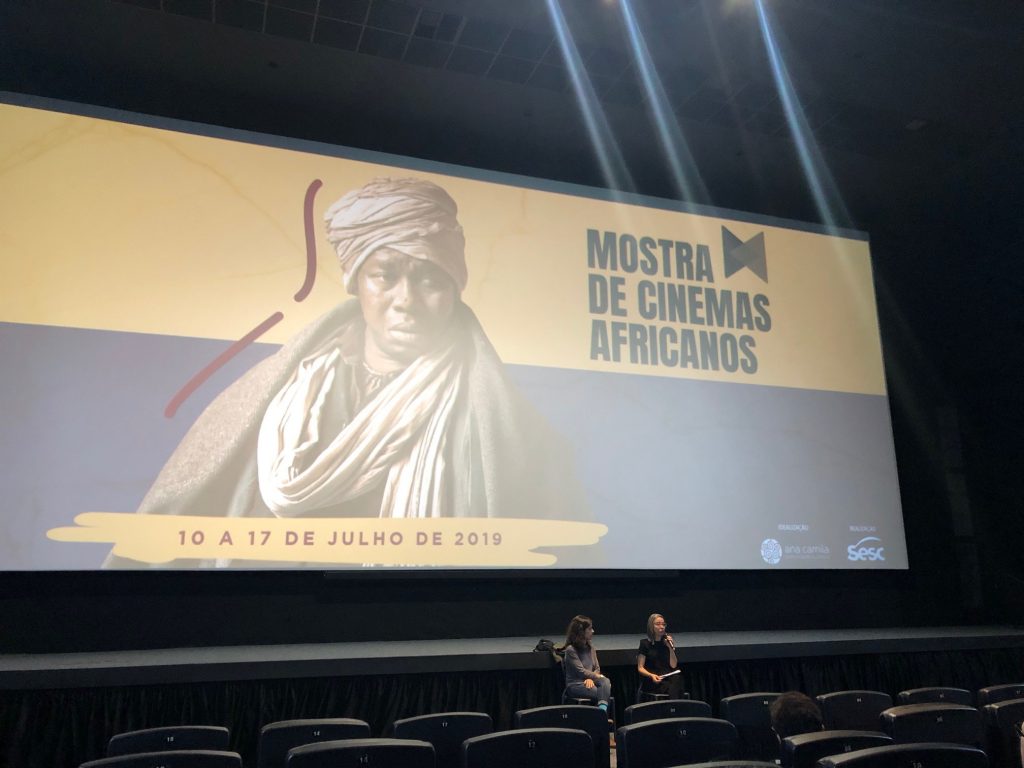São Paulo – The North African countries have strong and established film industries, with a great number of distribution spaces and viewers, which is made easier by the outreach of the Arabic language. That is what the African Film Festival cocurator Beatriz Leal said during a debate about the Arab-African film industry last Saturday after the screening of the movie Sofia at Cinesesc in São Paulo. The researcher Alesandra Meleiro also participated in the debate. The other curator of the show is Ana Camila Esteves.
“French colonies until the 1960s, [some] North African countries have similar traits regarding film production that set them apart from other African countries but are still heavily anchored by both African and European financial support,” said Meleiro. However, the Arab countries of the Gulf have increasingly financed African movies, Leal pointed out.
Out of the Sub-Saharan countries, the South African and Nigerian industry (known as Nollywood) are the highlights. “The other African countries have very small productions,” said Leal.
More than half of the movies in the African Film Festival are directed by women, with different themes. “They are all very beautiful themes that we wanted to address, and it’s curious that it’s not necessary that a woman talk just about female themes and vice-versa. The other non-Arab movies of the festival also show that,” said Leal.

The curator pointed out that the African productions financed by European countries usually had to film at least part of the project in Europe. “There were many [African] movies about traveling, and now they are there – the European productions are allowing everything is to be filmed in the African country,” he said.
An example of triangular production is the movie Sofia, filmed in Morocco by the Moroccan filmmaker Meryem Benm’Barek but financed by France and Qatar. For Leal, the geopolitical issue in the movies is very important. “South-South cooperation is more important than never right now,” she said.
According to Meleiro, over 150 movies are produced in Brazil every year and roughly half of them aren’t even screened in movie theaters. “The distribution issue makes it hard for the movies to reach the audience. Maybe it was necessary to invest more in this part of the process.” The researcher said the African film industry has grown over the last ten years and has caught the attention of festivals in the continent and around the world.
The African Film Festival is produced by SESC and Ana Camila Comunicação e Cultura and runs till Wednesday (17). After São Paulo, the show goes on to Salvador at Circuito Saladearte in September and Porto Alegre at Cinemateca Capitólio in October.
Sofia
Meryem Benm’Barek’s first feature filme, “Sofia” is set in Casablanca and tells the story of a twenty-years-old who only discover she’s pregnant when she starts feeling the contractions and her water breaks during a family lunch. She suffers from pregnancy denial, a psychological condition where the woman doesn’t know she’s pregnant and doesn’t even starts showing.

As if the complexity of an unexpected pregnancy followed by a delivery wasn’t enough, the Moroccan law forbids sexual relations outside marriage under penalty of one year in prison (Article 490 of the Moroccan Penal Code). The hospital that receives her gives her 24 hours for her to provide the father’s documentats before reporting the crime to the authorities.
During the debate, Meleiro and Leal talked about the multilingualism in Morocco as a way of social stratification. The movie shows that those in the country who speak French well are usually from a higher, more privileged class (such as Sofia’s aunt and cousin), have access to study and trips to other countries, while those who come from more poor households only speak Arabic (the fiancé Omar and his family – his mother isn’t even alphabetized) and, in some cases, the Berber, which is also an official language.
The filmmaker herself is an expatriate, had access to other languages and cultures, lived and studied in France and Belgium. Barek is 34 and, before “Sofia,” directed five short movies. “This trait of the director’s background is common among other directors of the festival. Most of them are expatriates that had opportunities,” Meleiro said.

The gender issue and the power of the social patriarchy in the country are the movie’s background, Leal pointed out. For her, the intersectionality of classes is the main point, since the fiancé (played by Hamza Khafif), from a lower class, accepts to marry her to help his family. “Sofia also talks about very fragile masculinities within a very complex state; the man is learning to reshape himself,” Leal said.
Played by the actress Maha Alemi, Sofia must make difficult choices in very delicate situations. A viewer commented during the chat, “Sofia has an unfair attitude under a society that is unfair to her.” For the festival’s production assistant Jusciele Oliveira, the movie shows that “the contemporary game is to know how to deal.” “Sofia” also features the Moroccan actor Faouzi Bensaïdi, who plays the main character’s father, and the Belgian daughter of a Moroccan father and Spanish mother Lubna Azabal, who plays her aunt.
Intimate and family issues, social and gender drama, Eurocentric and Arab-Muslim worldviews. All these are present in “Sofia.”
Translated by Guilherme Miranda




